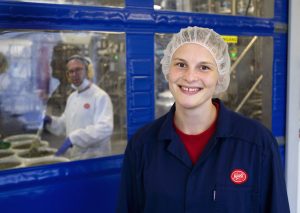Press release from Kavli Holding AS
The revitalisation of the company’s most traditional product also contributed a lot to that growth. The Kavli Group is a Norwegian-owned food company which operates in Norway, Sweden, Finland and the UK. It is best known for its Primula and Kavli cheeses, milk and yoghurt from Q-Meieriene, goats’ milk products from St Helen’s Farm and mustard products from Johnny’s.
The group is owned by the charitable Kavli Trust, which last year distributed 117 million kroner (9.4 million GBP) worth of funds to humanitarian work, research and culture.
Revitalised production
The groups turnover grew more than 6 percent in 2019, which means turnover grew from 3.536 billion kroner (284 million GBP) in 2018 to 3.747 billion (289 million GBP) last year.
“The increase in turnover is a result of our successful new launches and our increased market share within the group’s most important product categories,” said Kavli’s CEO Erik Volden.
He highlighted the successful revitalisation of the spreadable cheese which Kavli has been selling for more than 90 years and which delivered organic growth of more than 9 percent.
Higher raw material costs and considerable investments
The group’s annual accounts show a somewhat weaker operating profit than in the year before – 269 million kroner (21.6 million GBP) in 2019 compared to 287 million (23 million GBP) in 2018. This is a fall of just over 6 percent.
“We have an underlying growth in operating profit of 5.5 percent, but that is lower than what we had been aiming for. This is mainly due to higher raw material costs which have not been transferred to pricing, as well as work to increase capacity at several of our plants,” said Volden.
In 2019, the group initiated a major and future-oriented expansion of the Q-Meieriene plant in Jæren, Norway, at an estimated cost of some 750 million (60 million GBP) and has a planned start-up in the first half of 2021.
“It is very positive that the Norwegian agriculture authorities support stable framework conditions which make it possible to invest in the Norwegian food market,” said Volden.
Investments in the Finnish growth company Verso Food have so far not been living up to expectations and have impacted on the group’s 2019 results – both in the shape of impairments and due to the investment needed in starting up of a brand new plant. Verso is investing in vegetarian foods through products based on fava beans – also known as “the Nordic soybean”.

Profits go to good causes
Despite the challenges outlined above, the group will still be able to transfer a solid profit to the Kavli Trust. In line with the group’s development over the past few years, the Trust has increased its support for humanitarian work, research and culture considerably.
Work is being undertaken to make this even better known among consumers, so that more people know that their everyday choices when shopping for food is also making the everyday life of people who need help a bit better.
“Our talented employees take pride in this unique ownership and work hard to create value for good causes. In a year with heavy investments and increased debt, we are still transferring 73 million kroner (5.86 million GBP) to the Kavli Trust,” said Kavli’s CEO Erik Volden.
Planned product launches and cost-reducing measures mean the group is expecting both a growth in turnover and underlying operating profits in 2020.
Read more: Press release on the Kavli Holding AS website


